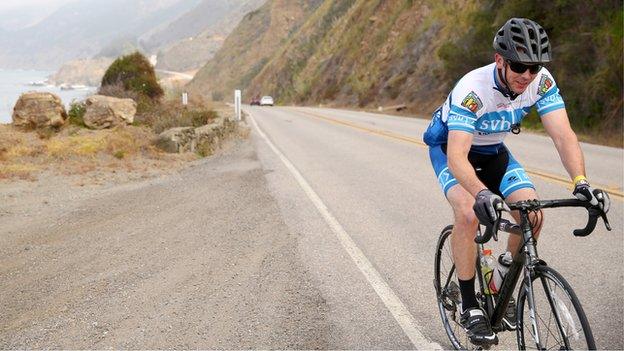How close did London get to hosting Tour de France 2017?
- Published
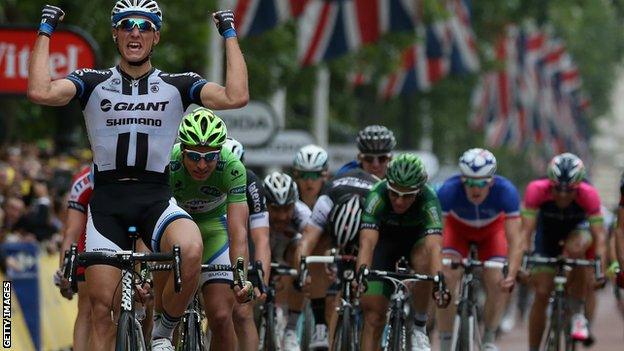
Germany's Marcel Kittel powers to victory in the third stage of the 2014 Tour de France, a day of elite cycling paid for by Transport for London
The proposed route for the start of the 2017 Tour de France would have seen three days of racing in London, East Sussex, Kent, Surrey and West Sussex.
Transport for London, the body running the bid, rejected the chance to host the start in September, just days before a deal was set to be announced.
But a Freedom of Information request has revealed just how far talks with ASO, the Tour's owner, had gone.
TfL's correspondence with the French also shows how dramatic its U-turn was.
The three stages would have taken place on 1-3 July.
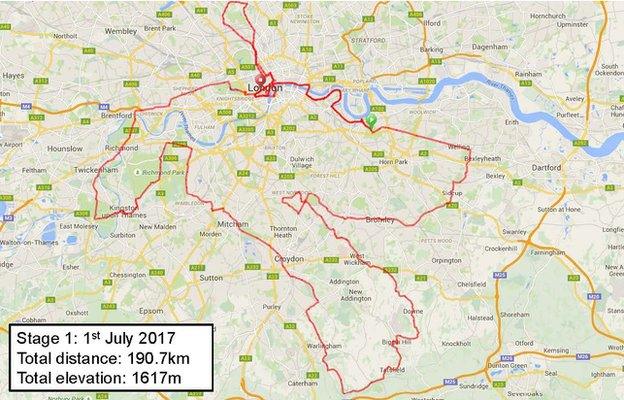
Stage one would have started in Greenwich, heading west through London towards Bushey and Richmond Parks, before a loop through Surrey back to The Mall, via a detour around Hampstead
TfL started talks with ASO about bringing the Tour back to London in January, with the then TfL commissioner Sir Peter Hendy taking the lead.
TfL's emails, letters and text messages suggest ASO was initially a little cool on the idea of bringing the race back to London again so soon after the success of its Grand Depart in 2007, external but by mid-March momentum was building.
A meeting in Paris on 27 May between senior TfL staff, Jon-Paul Graham from London mayor Boris Johnson's office and Tour director Christian Prudhomme's team appeared to have sealed the deal.
A day later Sir Peter emailed Leon Daniels, TfL's managing director for surface transport, and Ben Plowden, director of surface strategy and planning, to congratulate them and ask "when an announcement can be made!"
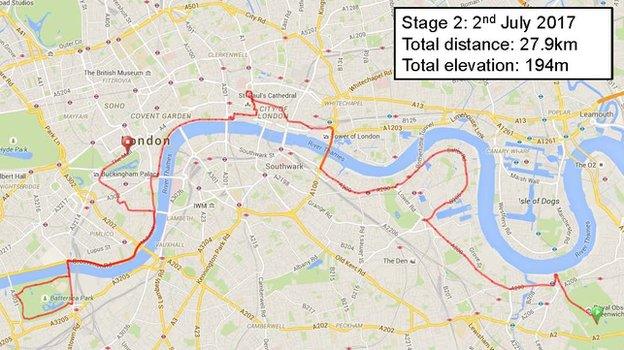
Stage two would have been a flat, east-west test of speed and strength against the clock, passing some of London's most iconic sights
The next four weeks saw proposed routes for the three stages exchange hands, a visit to London by ASO's route experts, and ASO ask TfL for data on cycling's growth , externalin the capital since 2007.
Chris Mather, TfL's head of behaviour change, claimed 2014 "was the safest year on record for London cyclists" and cycling was at an "all-time high".
By the beginning of August, TfL finalised its plans for the three stages and booked the Guildhall's Old Library for the launch and everything seemed ready for the deal to be announced during the World Road Cycling Championships , externalin late September.
But while ASO's staff took summer breaks following the race in July, bosses at TfL were in "delicate negotiations" with the Treasury about London's transport budget.
With the Department for Transport not one of the protected ministries in Chancellor George Osborne's Spending Review, TfL was told its £591m annual grant would be gradually withdrawn over the next three years.
Suddenly, the decision to spend an estimated £35m, which included a £4m hosting fee for ASO, on three days of elite sport, and with no input from UK Sport's major events budget, was made much harder and more political.
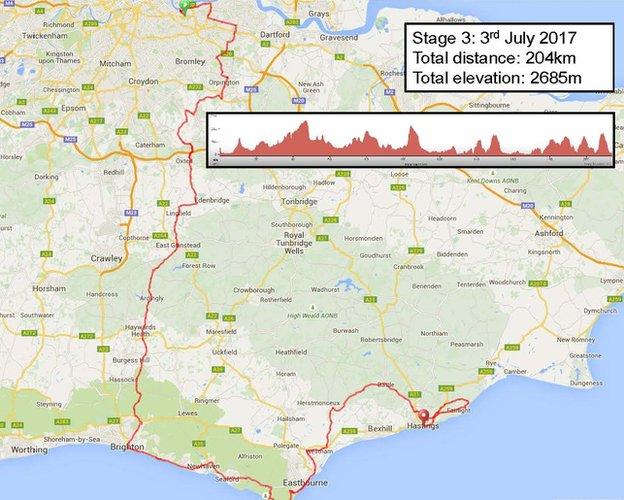
Stage three would have been familiar to London-Brighton riders, with a climb up Ditchling Beacon, before heading along the coast for a rolling finale into Hastings
The first ASO knew of this was in a letter from Leon Daniels to Mr Prudhomme on 15 September saying "recent events dictate that we can no longer offer to host a Grand Depart in 2017".
Mr Daniels explained the cuts, which were revealed last month to total 37% of the Department for Transport's running costs, and said TfL's spending "will be under intense scrutiny" as it fought to safeguard "front-line transport services".
He concluded by saying TfL was pulling out with "a heavy heart" and hoped to "welcome the Tour back in the future".
The BBC, however, understands ASO's initial response was anger and shock, particularly as time and bargaining power have been lost in the attempt to find an alternative Grand Depart host.
That search continues with Dusseldorf emerging as the favourite to replace what would have been three thrilling days of colour, noise and sport for cycling fans in London and the South East.
- Attribution
- Published28 September 2015
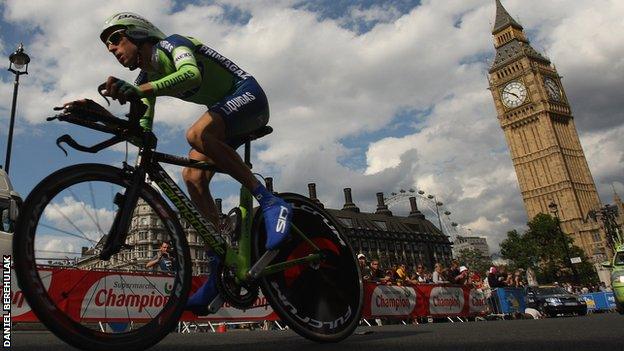
- Published14 July 2015
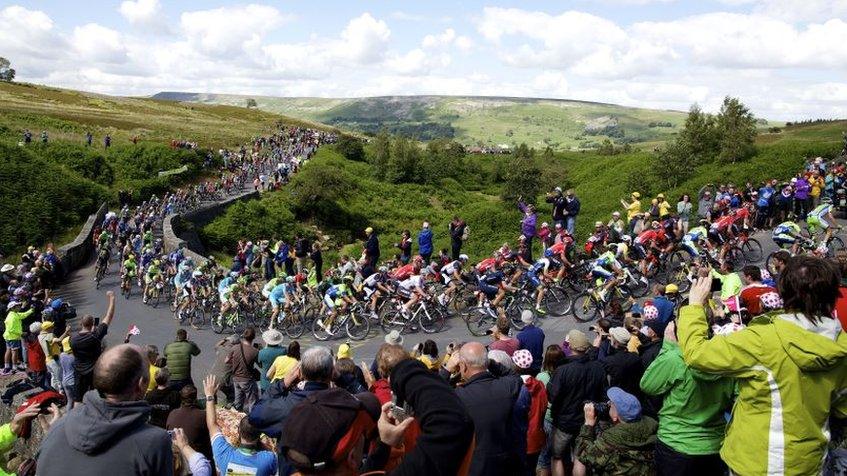
- Attribution
- Published4 December 2014
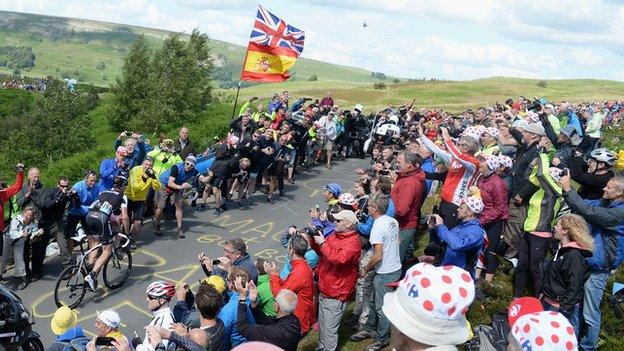
- Attribution
- Published19 May 2014
- Attribution
- Published4 September 2014
